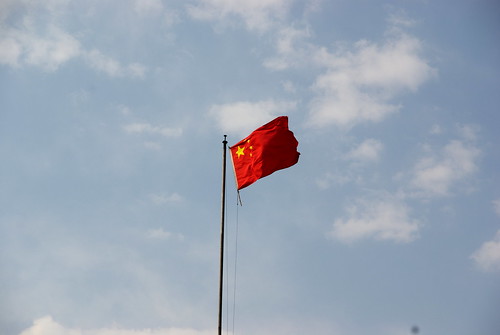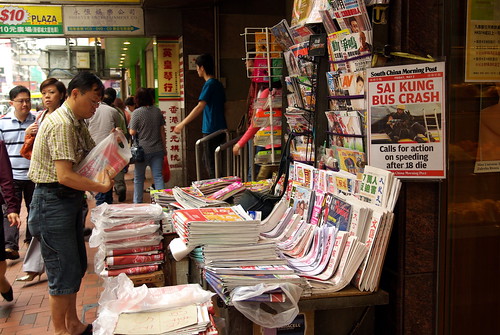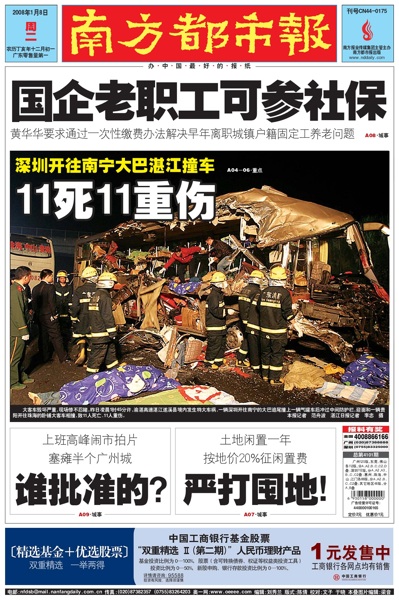
Photo by Xian HU, Journal Chinois Sept Days
“My Chinese face came as an advantage”, says 54-year old HU Xian (胡宪), a reporter for Chinese-language newspaper Sept Days (七天网) who just returned from an assignment in Kabul, and who will be telling her story at a seminar organized at the Montreal Chinese Cultural Centre on February 10th.
When the Canadian Defence Ministry invited Sept Days to send a journalist to Afghanistan, and later withdrew it (on the basis that it was becoming too dangerous), the Montreal-based weekly decided to send Hu anyways on an assignment to one of the most dangerous countries in the world. She set off for Kabul and arrived there by plane on December 20th, 2007, forgoing the original plan to fly into China and take a land route (impracticable because of the winter). Unlike surely most other Canadian journalists who were in Afghanistan in the past years, she was not embedded with Canadian troops, and could thus freely go wherever she wanted to – as long as it was in Kabul. Her Chinese appearance, and the fact that she is a woman, gave her special access to local folk that she met, which included Afghan women and private residences.
Early last summer, Hu started looking into the opinion of new immigrants of Chinese origin, whose numbers in Canada are exploding in the past decade, on the war in Afghanistan. “I wanted to see what Chinese people (in Montreal) thought of the war. So in July, I interviewed over 70 people and realized that 79% of the respondents were against the Canadian presence in that country”, tells the journalist who emigrated to Canada 18 years ago, and obtained citizenship two years later. According to opinion polls published in summer 2007 (Radio-Canada.ca), 1 out of 2 Canadians disapproved of the war in Afghanistan, while this proportion reaches two-thirds in Quebec. “I think that Chinese people, we have our own values, and there must be something about this”, which certainly echoes the justification given by many Quebecers who don’t support the conflict.
In Kabul, Ms. Hu stayed with friends of friends, journalists from China who came after the war. Through these contacts, she encountered a whole set of the local population, among which were a Chinese restaurant owner (who was Chinese), war widows running a carpentry centre and even the only Afghani female pilot (since her sister died), who flew a chopper.
The first article that Hu wrote upon her return was her change of opinion about the burqa, the traditional Afghan dress covering their wearers under them. Hu recalls: “Of course, I originally thought that the burqa was a symbol of oppression.” She met women in the city who were not happy when questioned about their wearing of the burqa. In the mountains, a woman said that her grandmother and mother wore it, that she wore it by choice, and that it was appropriate in her mind that she should “only be pretty for their husband”. In last week’s edition of Sept Days, the former university lecturer recalls her interview with a local journalist, whose first words to her were “Afghanistan’s situation is terrible“.
Sept Days expects a mainly Chinese-speaking audience to attend. However, her series of articles definitely reaches to mainstream society: “We have an opinion; we pay taxes too! What we want to say is that we are there too”.
HU Xian will be speaking at the 200-seat auditorium at the Montreal Cultural Centre in Chinatown (1088 Clark). She took over a hundred pictures while in Kabul, some of which will be showcased during the event. February 10th, 2008, 3 to 5PM. Tickets are 20$ on pre-sale and 30$ at the door. Half-price for students. Information (PDF file).
***

Photo by Xian HU, Journal Chinois Sept Days
« Mon visage chinois fût certainement un avantage », raconte HU Xian (胡宪), une journaliste de 54 ans pour le journal chinois Sept Days (七天网), juste de retour d’un voyage à Kaboul, et qui expliquera son histoire à une conférence organisée au Centre Culturel de Montréal, le 10 février prochain.
Après que le Ministère de la Défense du Canada eût invité Sept Days en Afghanistan, puis ensuite retiré l’offre (prétextant que le climat devenait trop volatile en Afghanistan), l’hebdomadaire montréalais décida de quand même envoyer Mme. Hu en reportage dans l’un des pays les plus dangereux du monde. Elle partit pour Kaboul et arriva en avion le 20 décembre 2007, laissant de côté le plan original de s’envoler vers la Chine et d’emprunter une voie terrestre (impraticable à cause de l’hiver). Contrairement à la plupart des journalistes canadiens partis en Afghanistan ces derniers temps, elle ne fût pas insérée dans une unité des forces canadiennes, et pouvait donc se balader où elle voulait – en autant que ça soit à l’intérieur de Kaboul. Son apparence chinoise, et puis le fait qu’elle soit une femme, lui donna un accès spécial chez les habitants qu’elle rencontra, incluant aux femmes afghanes et à des résidences privées.
Tôt l’été passé, Hu a commencé à se questionner sur l’opinion de la guerre en Afghanistan des nouveaux immigrants d’origine chinoise, dont les chiffres ont explosé lors de la dernière décennie. « Je voulais savoir ce que les Chinois (à Montréal) pensaient de la guerre. Alors, en juillet, j’ai interviewé 70 personnes et j’ai réalisé que 79% des répondants étaient contre la présence canadienne dans ce pays », dit la journaliste qui est arrivée au Canada il y a 18 ans, et est devenue citoyenne deux ans plus tard. Selon des sondages publiés lors de l’été 2007 (Radio-Canada.ca), 1 Canadien sur 2 était en désaccord avec la guerre en Afghanistan, tandis que cette proportion atteignait les deux-tiers au Québec. « Je pense que les Chinois, nous avons nos propres valeurs, qu’il doit y avoir quelque chose par rapport à cela », ce qui fait écho au discours des opposants à la guerre dans la population québécoise.
À Kaboul, Mme Hu est demeurée chez des amis d’amis, des journalistes de Chine qui sont venus après la guerre. À travers ces contacts, elle a pu rencontrer tout un échantillon de la population locale, incluant un propriétaire de restaurant chinois (qui était chinois), des veuves de la guerre opérant un centre de charpenterie, et même la seule femme pilote d’hélicoptère afghane (depuis que sa soeur est morte).
Le premier article que Hu a écrit à son retour fût sur la façon dont elle changea d’opinion à propos du port de la bourka, robe traditionelle couvrant entièrement celle qui la porte. « Initialement, je croyais bien sûr que la bourka était un symbole d’oppression. » Elle rencontra des femmes dans la ville qui ne fûrent pas heureuses qu’on questionne leur choix de la bourka. Dans les montagnes, une femme lui dit que sa grand-mère et sa mère l’ont portée, et que c’était approprié dans son esprit “qu’elle soit belle seulement pour son mari”. Dans l’édition de cette semaine de Sept Days, l’ancienne chargée de cours d’université raconte son interview avec un journaliste local, dont les premiers mots furent la « situation en Afghanistan est terrible »
Sept Days s’attend à un public majoritairement à un public sinophone. Cependant, la série d’articles de HU Xian rejoint définitevement le public général : « Nous avons une opinion; nous payons des taxes aussi! Ce qu’on veut dire c’est qu’on existe aussi. »
HU Xian donnera une conférence à l’auditorium de 200 places au Centre Culturel de Montréal dans le Quartier Chinois (1088 Clark). Elle a pris plus d’une centaine de photos à Kaboul, dont quelques-unes seront présentées lors de l’événement. 10 février 2008, de 15 h à 17 h. Les billets sont 20$ en prévente, et 30$ à la porte. Moitié-prix pour les étudiants. Information (Fichier PDF).









